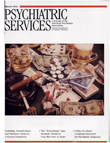Patients' requests and satisfaction with services in an outpatient psychiatric setting
Abstract
OBJECTIVE: Patients in four major diagnostic categories were compared to determine if their satisfaction with outpatient services varied. Both overall satisfaction and the degree to which clients and therapists agreed on the importance of 16 aspects of treatment were examined. METHODS: The Patient Request Form (PRF) and the Client Satisfaction Questionnaire were used to interview 464 outpatients. The professional who was the primary contact for each patient filled out a therapist version of the PRF. Diagnoses were grouped into four major categories: anxiety disorders, affective disorders, schizophrenia, and other psychotic disorders. RESULTS: The diagnostic groups differed in overall satisfaction with treatment, treatment characteristics, patients' reasons for coming to the clinic, therapists' descriptions of treatment, and patient-therapist agreement on the importance of different aspects of treatment. Agreement between patients and providers was associated with higher levels of patients' satisfaction. Patients with schizophrenia or with other psychotic disorders had the lowest level of agreement with their therapists and also were the least satisfied. In all patient categories, therapists underestimated the importance to patients of having a reliable source of help. CONCLUSIONS: The greater dissatisfaction expressed by patients with schizophrenia and other psychotic disorders may be related to their therapists' undervaluing the nonbiological aspects of treatment such as social support. Combining medication with psychosocial approaches that have been adapted for patients with psychotic disorders is likely to improve the patients' satisfaction and compliance and increase the overall effectiveness of treatment.
Access content
To read the fulltext, please use one of the options below to sign in or purchase access.- Personal login
- Institutional Login
- Sign in via OpenAthens
- Register for access
-
Please login/register if you wish to pair your device and check access availability.
Not a subscriber?
PsychiatryOnline subscription options offer access to the DSM-5 library, books, journals, CME, and patient resources. This all-in-one virtual library provides psychiatrists and mental health professionals with key resources for diagnosis, treatment, research, and professional development.
Need more help? PsychiatryOnline Customer Service may be reached by emailing [email protected] or by calling 800-368-5777 (in the U.S.) or 703-907-7322 (outside the U.S.).



